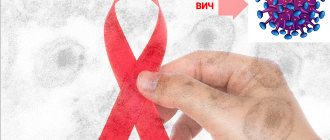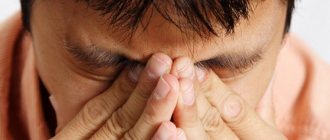Cancer phobia - what is it?
The obsessive fear of getting cancer (or, scientifically, cancerophobia) has become increasingly widespread in recent years.
We can easily see this from the increasing number of calls and letters from people who do not have cancer, but who suffer from anxiety, obsessive thoughts about cancer and other symptoms of phobia. Here is one of the typical cases that we encounter.
A year and a half ago, my mother left this world due to breast cancer. Since then, everything related to oncology, even just the word “cancer,” causes me terrible internal tension and fear. I'm afraid I might get cancer myself. Or perhaps I already have it, but I just don’t know about it. Recently I went through a period when I suffered from insomnia. I took sleeping pills to somehow improve my sleep. Many people would consider sleepiness and lack of energy to be a natural state after taking the pills, but I had myself thinking about a brain tumor. I did an MRI of the head and neck. The test results are completely normal. And it happens all the time: if something tingles somewhere or, excuse me, itches, I begin to be afraid and worry: what if it’s cancer? Over the past 9 months, in addition to tomography, I have undergone various diagnostic procedures - colonoscopy, x-ray of the lungs, ultrasound of everything possible... Everything is clean everywhere. Recently, after feeling nauseous several times, I can't help but wonder if I have stomach cancer. I know in advance that the tests will again show normal, but I can’t do anything about my anxiety. Moreover, the words “Cancer patient” are constantly ringing in my head like a bell. I'm very afraid of them. My husband is very worried about me. He believes that I will drive myself into neurosis with my obsessive fears. Please help me get rid of this phobia - fear of cancer.
Read prayer for fear of getting sick
It is normal to feel fear because it is an inner instinct. The fear of getting sick can be overcome. Someone advises to pray. Turning to higher powers is something like meditation. It allows you to achieve inner harmony, gives relief and calm. There are several prayers that can help you get rid of anxiety.
First of all, you should learn short prayers to Christ and other saints. In moments of fear, they will help you calm down. The prayer for Christ is as follows:
Prayer to Jesus
The Lord's Prayer is the best prayer in situations where fear sets in. This is the best way to deal with anxiety:
Our Father
One cannot help but say about the prayer of the Optina elders. Read it every morning:
Prayer of the Optina Elders
It is important to understand that prayer will only be effective if you yourself believe in the Lord. And faith presupposes some responsibility for one’s lifestyle
Live in accordance with the commandments and you will be happy.
Symptoms of cancerophobia
For some people suffering from carcinophobia, even such a seemingly innocent photo can cause severe anxiety and fear.
Despite the fact that in each specific case of phobia the symptoms vary slightly, there are symptoms common to all those suffering from cancerophobia.
- A feeling of uncontrollable anxiety when faced with a real or mental encounter with something reminiscent of the existence of a disease such as cancer;
- Inability to live and work normally due to disturbing thoughts bursting into consciousness about a possible cancer.
- Feeling the need to do everything possible to avoid cancer (endless tests, tests, examinations, etc.)
- Understanding that your fears are groundless, but unable to cope with your growing anxiety.
Symptoms of cancerophobia affect the thinking (mental), emotional and physical spheres.
Mental symptoms:
- Images associated with oncology spontaneously popping up in the mind;
- Obsessive thoughts about cancer;
- Inability to switch to other thoughts not related to the phobia;
- Feeling of unreality of what is happening (derealization);
- Fear of losing control, going crazy, or losing consciousness.
Emotional symptoms:
- Constant concern about upcoming events that are associated with cancer;
- Constant fear of getting cancer, discovering a tumor, etc.;
- An almost instinctive desire to avoid situations and places that remind you of cancer;
- Irritability, anger at oneself, feelings of guilt and helplessness.
Physical symptoms:
- Lack of air, shortness of breath;
- Palpitations or chest pain;
- Dizziness;
- Feeling of derealization;
- Nausea;
- Shiver.
Symptoms of cancer phobia may be mild. In this case, the usual advice that people give to each other helps a lot: “relax”, “don’t pay attention”, “take a deep breath”, etc. In other words, the problem is at the level of consciousness and is well controlled by it.
But when fear sits deeper - in the subconscious, the feeling of anxiety can go off scale and even reach the strength of a full-fledged panic attack. Moreover, even a fleeting thought about cancer can be the trigger for a panic attack. The advice “don’t worry” will be completely useless here. Obviously, more effective means are needed (we'll talk about this a little later).
What are the reasons for the phobia of getting cancer?
Cancerophobia may appear after one of your relatives or friends has been given a disappointing diagnosis. Surely, you noticed in the example above that the author of the letter developed symptoms of cancer phobia after the illness and death of her mother.
A separate category is people who actually had an oncological diagnosis, underwent radiotherapy, chemotherapy, in a word, difficult treatment. We looked the disease in the eye, so to speak. As a rule, their cancerophobia takes on the features of a fear of relapse of pathology.
However, many of those who complain of a constant fear of getting cancer cannot remember exactly when and why it all started. If you delve well into your memories, for example, with the help of hypnosis, you always discover the root causes of cancer phobia. Among the triggers, films, books and articles from the Internet about cancer patients are often found. Some particularly impressionable people are capable of being very deeply imbued with what they read, trying it all on themselves.
One way or another, no one is born with carcinophobia, it is always an acquired baggage. It just so happened that one day you were overtaken by an understanding of the possible consequences of the development of malignant tumors, you felt the fear of death. Understanding is deeper and clearer than that of other people, thanks to your impressionability and imagination.
Some part of your brain was very scared at that moment and is still afraid. You may not remember this, say, if it is a childhood trauma.
To get rid of cancer phobia, it is not necessary to know the cause of the disorder. And that's why.
Phobia mechanisms, or how you create your fear
All symptoms of cancerophobia, from anxiety to tachycardia with derealization, are the result of various processes occurring in our psyche. At the same time, many psychologists identify 2 processes as fundamental in the formation of a phobia:
- Cognitive schemas.
- The body's reactions to what is happening (behavior).
Cognitive schemas are how you use your mind. Those. your habitual ways of thinking. This, in particular, includes your beliefs and values, knowledge about something (for example, about cancer), and features of internal dialogue with yourself.
The body's reactions to what is happening include, for example, how exactly your breathing is carried out, the movements of your hands, body position and many, many other behavioral characteristics in certain situations.
Cognitive schemas and behavioral reactions are like “bricks” from which any emotional state can be “assembled.” For example, you can easily recognize a depressed person in a crowd by their behavioral reactions: head and shoulders down, back bent, shallow breathing, sad facial expression... Common cognitive patterns in depression include an endless string of questions asked to oneself that have no solution, but only aggravate the problem; thoughts that life has no meaning, etc. [43].
Manifestations of cancerophobia are no exception. An attack of fear - an all-consuming anxiety that makes your stomach churn, intrusive thoughts and images arise - all this can also be broken down into components.
What will this breakdown of emotional states into its component elements give us? Very simple: complete control over emotions. This is similar to the work of a chemist in a laboratory: you first decompose a complex substance into individual components, then synthesize something new from them.
This leads to 2 news: good and bad.
- The bad news is that your fear of cancer is solely the result of your behavior: mental and physical. You create cancerophobia yourself, from many negative mental and behavioral components. In your justification, however, we note that people do this automatically, without meaning to.
- The good news is that getting rid of your cancer phobia (as well as creating it) is also in your hands. And you are able to overcome cancerophobia. Like many other people who have walked this path to health.
How to do it? First, you need to believe that you and no one else are responsible for your emotional and psychological well-being. For “according to your faith be it done to you.”
Possible reasons and prerequisites
As I already mentioned, the development of social phobia is influenced by external and internal factors. Yes, even your own insecurity or anxiety is the result of outside influence (in childhood or adulthood). The following prerequisites for the emergence of social phobia can be identified.
- Depression (70.9% of cases) or other disorders.
- Drug addiction, alcoholism (76.7%). Public condemnation can be received more often than support and help, which forces the alcoholic to withdraw into himself, increasingly avoiding society.
- Experienced situations of failure. Having once "shitted" in public, a person will probably avoid performing again.
- Properties of the psyche. Accented individuals, that is, with a pronounced character trait, are more prone to phobias. For example, the schizoid and asthenic type are the most vulnerable. The same dependence is observed among temperament types. Choleric and melancholic people are more prone to phobias.
- Someone else's experience. Often, sophiophobia begins to form in childhood and is caused by the behavior (example) of parents or parenting style. For example, intimidation, prohibitions, or one’s own experience of failure in front of a child.
- Low self-esteem and uncertainty that arose against the background of social deprivation (deprivation) in childhood. This group includes a tyrannical type of parental education, an authoritarian teacher, and “bullying” in the classroom.
- Low self-esteem. Often comes from a destructive type of parental upbringing or school childhood.
Is treating cancerophobia with medications effective?
We have already written that so-called “drug treatment” is widely used to treat phobias, including the fear of cancer. Medicines used include both traditional anxiolytic drugs, such as benzodiazepines, and newer drugs: beta blockers and antidepressants [].
Benzodiazepines (diazepam, alprazolam, gidazepam) are drugs with anti-anxiety, sedative and hypnotic effects. Inhibits the activity of the central nervous system. With prolonged use they cause physical dependence and addiction. Beta blockers (anaprilin, etc.) can reduce some of the physical symptoms of a phobia, such as heart palpitations or trembling hands, by changing the action of adrenaline, which is released during anxiety. However, beta blockers do not affect emotional and mental symptoms. Antidepressants . Some are approved for phobias and anxiety disorders. However, we have already written about the many serious pitfalls of antidepressant treatment here.
The phrase “drug treatment” is put in quotation marks for a reason. Is it possible to call a treatment a method from which recovery, by and large, does not occur? After all, pills can give a quick effect, but they do not cure. The relief will only be temporary, since taking medication in no way affects the root of the problem - the usual cognitive and behavioral patterns. After completing the course of medication, all symptoms of cancer phobia return in full force [].
In addition, you are exposing your brain to a chemical attack, the side effects of which can be very dangerous. Not to mention the psychological and physical dependence on medications.
So, not only do medications not change the thought and behavioral patterns that make up carcinophobia, but, moreover, if you have even the slightest hope of getting rid of your phobia with the help of pills, it means that you internally do not believe that your negative emotions are yours. handiwork. Therefore, you are still far from conquering the problem.
Meanwhile, the best cure for cancer phobia is to stop taking medications. This is the only way you get a chance to live a happy and peaceful life. Become the master of your emotions and fears. However, if you are already taking medication, you should consult your doctor before making any changes. Sudden cessation of pharmacotherapy poses a health risk.
The occurrence and onset of cancer
Scientists have reported that they have discovered and tracked the process of how people get cancer. Some molecular interactions between cells are disrupted and lead to the formation of stickiness (adhesion). As a result, tissues begin to accumulate abnormally in one place, and over time they move away from the original tumor and attach to a new place. This is how metastasis occurs, which kills 8 million people every year. And only in 10% of deaths is caused by a primary tumor.
Ultimately, cancer is the result of a disruption in the orderly process of cell division and cell death. Unlike normal tissue, cancer cells continue to grow. This is how malignant masses accumulate.
How to get rid of cancer phobia yourself?
There are many techniques to get rid of phobias. Some of them require skill to use, and it will be difficult to do without an experienced psychotherapist. But there are also those that are quite feasible for treating cancerophobia without outside intervention. Here is one of them.
Its operating principle is based on a simple mechanism. Whenever you are in some unusual situation - pleasant or unpleasant - the brain forms a connection between the emotion you are experiencing and something you see, hear or feel at that very moment.
For example, once, while in a temple, you experienced a feeling of special uplifting of spirit. At the same time, you inhaled the smell of incense. In the future, as soon as you hear the smell of incense, you not only remember this wonderful feeling, but even begin to experience it again. A pleasant emotional state at the physiological level was associated with the smell of incense.
Or perhaps you know a melody or song that makes you sad and difficult to hold back your tears. Just like it was when you heard the melody for the first time.
Quite strong neural chains can arise in the cerebral cortex - conditioned reflexes that tightly tie emotions to something from the environment. And it is precisely this feature of the human psyche that you can use to get rid of the fear of getting cancer.
You just need to attach positive emotions, say, calmness and confidence, to some specific action. For example, rubbing the earlobe. In the future, when the symptoms of a phobia begin to “cover” you, you touch your ear, and the intensity of the fear decreases. Gradually the phobia becomes weaker and weaker until it completely dissolves.
The secret of the technology is that positive emotions must be really strong, and also tied to the trigger quite well. This means you will need to train a lot and hard. We provide an approximate program for such a workout below.
A step-by-step plan for independent work with a negative emotional state in cancerophobia
- Choose a strong and distinct positive experience. This is your weapon with which you will repress fear. You can remember something meaningful and pleasant for you. Search your memory. When did you feel joyful, confident, calm? Perhaps in childhood, when in the morning they discovered gifts under the Christmas tree. Or in your youth - during your first kiss? Recently, while relaxing in nature?
- Choose a trigger action that you will use to activate a positive resource during each attack of a phobia - the fear of cancer. It should be an action that you don't do often and that doesn't attract other people's attention. For example, this could be a massage of the little finger of the left hand, an inconspicuous pinch on the thigh, etc.
- Remember all the details of a pleasant memory: smells, sounds, taste in your mouth, visuals. At some point you will feel a pleasant sensation in your body. At this point, breathe as if you are moving air from the top of your head to your heels. Try to fill every cell of your body with a pleasant feeling. Repeat this exercise several times to achieve a stable intensity of sensations.
- When the sensations have stabilized at their maximum, begin to massage your earlobe, finger, in a word, begin to carry out the action from step 2. 7-8 seconds is enough.
- Return to your normal state of health.
- Repeat the sequence according to paragraphs 2-4, making the pleasant experience more and more distinct, simultaneously strengthening the connection with the selected stimulus. The more repetitions you do, the better.
- Create a “collection of positive experiences”, for this you need to go through pp. 1-6. As you guessed, new pleasant experiences and sensations are needed, as well as new, not yet used, actions (stimuli) for attachments.
When you feel ready, you can begin the most important thing - the practical application of the acquired skills. When faced with negative thoughts about cancer, pop-up images and other symptoms of cancerophobia, you need to start doing one of the actions from your “collection”. It should be performed for much longer than 7-8 seconds.
Even a slight improvement in your emotional state is a small victory, a good sign that gives you hope. As we said, for sustainable success you need to practice and practice some more.











